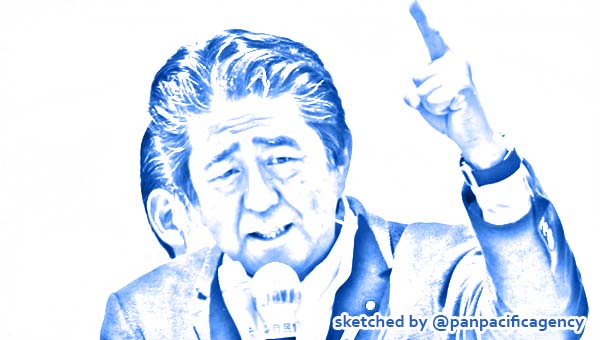Japanese scholar criticizes Abe over historical revisionism

Photo by the Kyodo. Sketched by the Pan Pacific Agency.
TOKYO, Dec 22, 2019, The Korea Times. A Japanese historian has stepped up criticism against Japanese Prime Minister Shinzo Abe’s push for historical revisionism and his reluctance for the country to take responsibility for its wartime wrongdoings. These have led to Tokyo’s countermeasures to the October 2018 South Korean Supreme Court ruling on wartime forced labor compensation, The Korea Times reported.
“The Korean Supreme Court’s ruling last year ordering Japanese firms to compensate the surviving South Korean victims of forced labor under Japanese colonial rule was to seek recovery though law regarding the colonial occupation and forced labor and mobilization during the war,” Osamu Ota, a history professor of Doshisha University, said during a recent written interview with The Korea Times. “But the Japanese government and many media organizations have repeatedly spread the idea that the issue has been already resolved between the countries. The Abe administration has increased criticisms against the Korean government and Korean society.”
He made a presentation during the International Symposium for the Future-Oriented Korea-Japan Relations held in Seoul on Dec. 10 where he stressed that the recent disputes between Seoul and Tokyo were due to the Abe administration’s historical revisionism which justifies the colonization of Korea and the war.
Ota said despite the Abe administration’s historical revisionism, some Japanese people have been seeking self-reflection on their nation’s history of colonization and wartime wrongdoings.
“In the 1990s, when South Korea achieved its political democratization and the Cold War regime collapsed, the Japanese government began to turn to reflect on its past colonial rule and wars of aggression. The release of the Murayama statement in 1995 is a symbolic move of this, and the Korea-Japan Joint Declaration in 1998 and the Naoto Kan Statement ensued which declared that the 1910 Korea-Japan Treaty was signed against Koreans’ will.”
He said Abe’s statement made in 2015 was representative of the current government’s perception and goes against Japan’s past efforts toward self-reflection.
The scholar also noted that more remarks justifying Japan’s colonization and aggression appear to be made in public under the Abe administration, with strong backing from the Japanese media which is not taking its responsibilities as a watchdog and only giving the government’s rhetoric a platform.
“Media should never have a cozy relationship with power. However, many Japanese media outlet are now failing to fulfill their responsibilities. Not only that, but also the media is boosting nationalism and hatred fueled by capitalistic desires. It’s a serious issue.”
Tokyo’s view of 2018 ruling
Behind such aggressive moves of the Japanese government and media, he pointed out that the Abe administration may consider the Seoul court ruling shocking as it directly challenged the country’s modern law which never questions the past wrongdoings of Imperial Japan.
“For Japan, the court ruling was something barbaric, and at the same time shocking or to be feared,” Ota said.
“I think the administration has a strong desire to cover up the court ruling as it asks Japan to take responsibility for the colonization. Since the Meiji era, Japan has been colonizing countries and waging aggressive war in the process of modernization along with Western powers. After Japan’s defeat, the country was criticized by its allies for its legal responsibility, but was never asked to take responsibility for colonization.”
The professor added that the Japanese government wants to bury the history of Japan’s wrongdoings by claiming that “the problems have been resolved.”
“But there are rulings and academic research proving the use of forced labor under the Japanese government’s policy. The Japanese government and media should make their arguments based on academic research especially on the reasons why the victims were forced to work.”
He also pointed out the importance of continuing dialogues between individuals and governments of both countries in many areas.
“There would be no ultimate solution. I think those involved in politics, media, research, education and civic society must continue to talk with one another persistently and politely. I have made such efforts too, and I would like to continue, through my lectures and writing.”
Regarding the forced labor rulings, he also said there will be ways for the victims and companies to reach a settlement through reconciliation. He underlined the need for efforts to overcome the past, such as fact-finding, clarifying responsibility, recovering the victims’ dignity, compensation and never forgetting history.